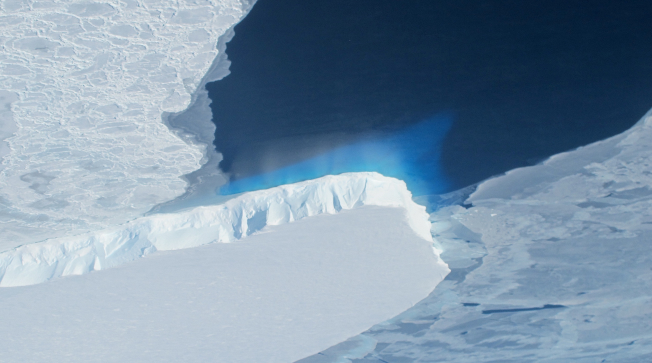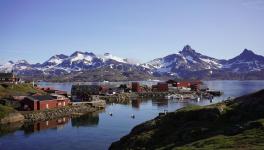Climate Change: Depletion of Greenland’s Ice-Sheet Reaches the Point of No Return

Image Courtesy: NASA.
Man-made climate change has started showing its adverse effects, most prominently in the form of global warming. The effects of the resultant global warming can be seen in instances of melting ice and the rising sea level.
The world’s largest island of Greenland is particularly crucial for gauging the level of ice depletion due to global warming. Recent research published in the journal Nature has put forth a worrisome picture about the ice-sheet depletion in Greenland. It said that the melting of Greenland’s ice sheet has reached a point of no return; even if global warming stops today, the ice sheet will continue to shrink. The researchers studied satellite data from the past 40 years to arrive at the conclusion.
Generally, glaciers melt in the summer and the winter’s snow deposits more than compensate for the loss. However, researchers found that Greenland’s ice sheets would now never be replenished by winter snow. It would continue to melt and flow into the ocean.
Michalea D. King, the lead author of the study from the Ohio State University, reportedly said: “We've been looking at these remote sensing observations to study how ice discharge and accumulation have varied. And what we've found is that the ice that's discharging into the ocean is far surpassing the snow that's accumulating on the surface of the ice sheet."
King’s team analysed monthly satellite data of more than 200 such glaciers. They estimated the amount of ice that gets drained off into the ocean and the amount of snowfall each year.
Their analysis showed that during the 1980s and the 1990s the snow accumulating in glaciers was greater than the amount of ice melting and getting drained off. During the period, researchers found that 450 gigatons (1 gigaton= 10^12 kilograms) of ice was lost from the glaciers each year. However, back then, the amount of snowfall was replenishing the ice lost.
Explaining the estimation process that the research team adopted, King was quoted saying: “We are measuring the pulse of the ice sheet – how much ice glaciers drain at the edges of the ice sheet – which increases in the summer. And what we see is that it was relatively steady until a big increase in ice discharging to the ocean during a short five- to six-year period.”
The researchers found that ice started melting rapidly after the year 2000, with glaciers losing over 500 gigatons of ice each year since then. However, snowfall rate did not increase during the period and it has come to a point where there is more ice melting than it is being replenished. This two-decade trend has pushed Greenland to the point of no return.
Research says that the glaciers around Greenland have decreased by around three kilometres on an average since 1985. It also means that many glaciers have shrunk and are now amidst ocean water, which indicates that more and more ice is in contact with water.
Losing Greenland’s ice sheets will have repercussions for the entire world. Melting ice from the sheets will flow into the Atlantic Ocean, and eventually to all the other oceans of the world. Ice from Greenland is also a key contributor to rising sea levels. According to an estimate, ice-sheet melting from Greenland caused the oceans to rise by about 2.2 millimeters within two months.
Get the latest reports & analysis with people's perspective on Protests, movements & deep analytical videos, discussions of the current affairs in your Telegram app. Subscribe to NewsClick's Telegram channel & get Real-Time updates on stories, as they get published on our website.
























